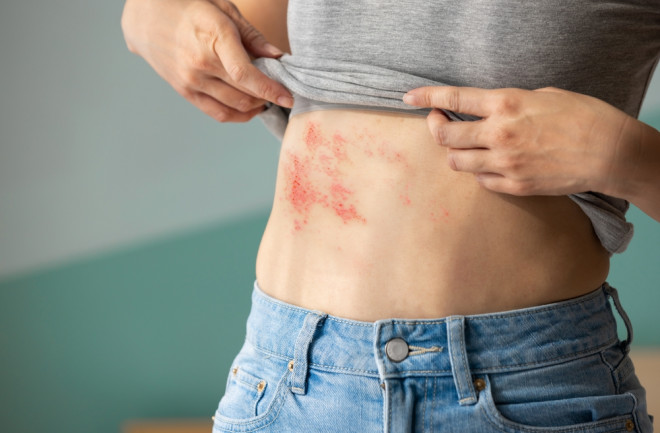Shingles has long been considered a disease that impacts the older population — people over the age of 50. In the U.S., one in 3 adults will get shingles in their lifetime, and in recent years, more and more people have been diagnosed with the disease across all age groups, according to the Centers for Disease Control and Prevention (CDC). Researchers aren’t entirely sure what’s driving the change, but they do have some clues.
What Is Shingles?
Shingles is a viral infection caused by the varicella-zoster virus. It lives inside the body of anyone who has had chickenpox and can reactivate into adulthood as shingles.
Shingles typically presents as a rash or group of blisters that often appear on the left or right side of the torso. The rash is typically painful and itchy and can feel like the skin is burning. Fluid-filled blisters, sensitivity to touch, fatigue, and fever may also accompany it.
Can Young People Get Shingles?
Yes, young people can get shingles, but it’s important to note that people who are younger than age 25, who got the two-dose chickenpox vaccine known as varicella vaccine, are not getting shingles very much, says Jennifer Moffat, a microbiologist who specializes in shingles and chickenpox at the SUNY Upstate Medical University in Syracuse, New York.
You can get shingles if you have never had chickenpox, but it's mostly those over age 25 who were children before the varicella vaccine was around and instead got what’s called the “wild virus” or actual chickenpox. Those who got chickenpox or were around people who got chickenpox are getting more shingles than in the past,” says Moffat.
Read More: Viruses: What They are, How They Spread, and How We Fight Them
Why Are More Younger People Getting Shingles?
According to Moffat, the short answer is that although many smart people have made many hypotheses about why numbers are increasing in the age 25-50 cohort, research doesn’t point to any particular reason why these numbers are increasing.
“One hypothesis is that our society goes to the doctor at the drop of a hat,” says Moffat.
The term is referred to as “care-seeking,” and it means that we’re more likely than we used to be to go to the doctor the moment we have a rash.
Another thought is that doctors are seeing the condition more often and are better trained to know what it is and diagnose it than in years past. As a result, says Moffat, “it’s entering the medical records more often.”
There was also a thought that the population as a whole is less healthy today, which causes their immune systems to be suppressed. Still, even as doctors have looked at all these ideas up and down, they’ve yet to show this in any medical literature. The bottom line, says Moffat, “we just don’t know what’s causing the increase.”
Read More: Why We Feel So Terrible When We Get Sick
Can Stress Cause Shingles?
Stress can lower your body’s resistance to the virus, resurfacing as shingles. “It’s always looking for a chance to pop out, and if you wear yourself down, the immune system can’t push the virus back,” says Moffat.
A September 2017 study published in The American Journal of Epidemiology found that men under higher levels of mental stress were twice as likely to be diagnosed with shingles. Women who experienced stress and negative life events had a 2-3 fold higher risk of post-herpetic neuralgia, pain caused by shingles that lasts well beyond the disease.
Stress plays a role, but so do other health conditions that might cause weakened immunity, says Paul Gisbert Auwaerter, clinical director of the Division of Infectious Diseases at Johns Hopkins University School of Medicine. Diseases like HIV, lymphomas, or immunosuppressant medications can make you more vulnerable to the condition.
Read More: The Biology of Stress in Your Body
Who Should Get the Shingles Vaccine?
If you’re under age 25, then there’s a good chance that you’ve been vaccinated for chickenpox which not only protects you against chickenpox, but also shingles. Children under age 13 should get two doses of the varicella vaccine: the first dose at age 12-15 months and the second dose at age 4 to 6 years.
If you get shingles when you’re younger, it doesn’t necessarily protect you from shingles down the road. So you should still get the shingles vaccine, called Shingrix, at age 50 or if you’re age 19 or older and are immunocompromised.
Read More: What Would Happen If We Didn't Have Vaccines?
How Is Shingles Different in Younger Populations?
The good news is that even though younger people are getting shingles more often, they’re getting a less severe version. Generally, this group is less likely to get post-herpetic neuralgia, which, for Auwaerter, is among the most worrisome complications of the disease. The more serious cases in older individuals are more likely to include nerve damage as a result of the virus that persists with pain and can be long-lasting.
“Usually, when you get shingles under age 50, and you’re not immunosuppressed, it’s a mild case,” says Auwaerter.
Article Sources
Our writers at Discovermagazine.com use peer-reviewed studies and high quality sources for our articles, and our editors review for scientific accuracy, and editorial standards. Here are the sources used in this article:
Centers for Disease Control and Prevention. Shingles Burden and Trends.
American Journal of Epidemiology. Associations of Perceived Mental Stress, Sense of Purpose in Life, and Negative Life Events With the Risk of Incident Herpes Zoster and Postherpetic Neuralgia: The SHEZ Study.
Read More: Why Do I Get Sick So Often, While Others Stay in Freakishly Good Health?

